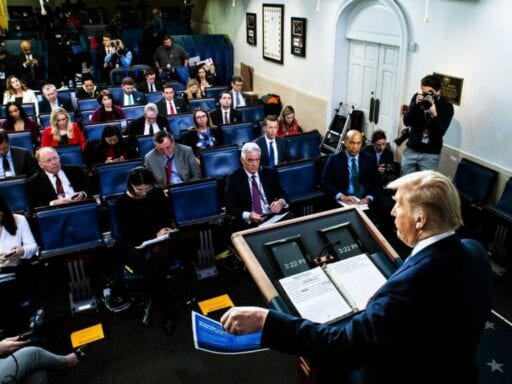National Review’s editor misreads the meaning of the coronavirus crisis in a particularly dangerous way.
Responding to the coronavirus pandemic requires infringements on civil liberties that citizens of democratic states would never otherwise tolerate. But while shelter-in-place orders and amped-up digital surveillance may be helpful in containing the virus’s spread, they carry the danger that temporary exigencies be confused with permanent necessities, that the illiberal exception becomes the rule — survive the crisis and threaten our politics, even in normal times.
Rich Lowry, the editor of the conservative flagship magazine National Review, just provided us with a great example of this thinking in action. Tuesday afternoon, he published a short blog post titled “We’re All Orban Now” — a reference to Hungarian Prime Minister Viktor Orbán, a man who has exploited fear of Muslim immigration to systematically dismantle his country’s democracy.
Lowry’s argument is that the coronavirus lockdowns have validated Orbán’s concerns about immigration and, more broadly, the strongman’s skepticism about the European Union’s internal open-borders project. In his mind, the temporary travel restrictions going up inside Europe and around the world prove that all of us are closet nationalists.
“This crisis is bringing home that, when push comes to shove, everyone believes in borders,” Lowry writes. He continues:
I’m a neutral in the intra-conservative war over Orban, but the basic premises undergirding his position in the contention with [German Chancellor Angela] Merkel were obviously correct: The government of a nation exists to serve the people of that nation and should put their interests first; nations are distinct bounded entities delineated by borders, which are always important but especially so in a crisis; if anyone tries to tell a democratic nation how it should control who or what comes over its border, the appropriate answer is, “Go to hell.”
Lowry’s logic is badly flawed. The travel restrictions around the world are not born out of some kind of “every country for itself” nationalism; they are policies that exist to benefit every country. In the extreme circumstances of a pandemic, it’s good for everyone that people aren’t moving around and spreading the virus. There’s a reason the US and Canada, for example, jointly negotiated the terms of their border closing.
Travel anywhere could be a danger to everyone everywhere — a point that also applies to travel inside national borders. The fact that Bay Area counties have issued a shelter-in-place order does not mean that local leaders are asserting the moral primacy of San Francisco over Sacramento.
Lowry, coincidentally the author of a book titled The Case for Nationalism, is confusing an emergency measure with an ideological statement. I’m an avowed supporter of open borders under normal conditions, but I also believe that free movement of people both inside and outside national borders is, at this specific moment in time, a challenge for public health and should therefore be discouraged and curtailed. There is nothing contradictory in those views, any more than it’s contradictory to say that invading Germany now would be be wrong, but doing so when the country was controlled by Nazis was okay.
But what troubles me about Lowry’s post isn’t just the sloppy logic.
Lowry effaces the authoritarian purpose of Orbán’s closed-border nationalism, the manner in which Hungary’s leader uses it as a cudgel to delegitimize his political opponents and justify increasing state control over every sector of Hungarian society. Lowry casts himself as “neutral” on Orbán, but praising his ideological project with respect to Europe while downplaying its role in the development of an avowedly illberal political regime is anything but.
This move shows that crises can contribute to authoritarianism. Political elites can start to confuse radical measures with normal ones, to valorize the extreme measures used by authoritarians, recast their ordinary practices of control over civilians into a model for democracies. Illiberal political leaders exploit these crises to expand their powers, sometimes to thunderous applause.
Coronavirus is a crisis not only for public health but also for our political institutions. In liberal democracies, we need to be especially wary of this crisis being exploited for authoritarian ends — especially by authoritarian demagogues in positions of power who use the language of border protection to justify their worst cruelties.
Author: Zack Beauchamp
Read More



